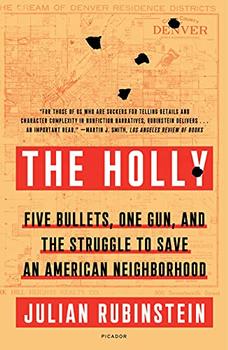Summary | Excerpt | Reviews | Beyond the book | Read-Alikes | Genres & Themes | Author Bio

How America Arms Gangs and Cartels
by Ioan GrilloOn the surface, the role of a gun used in a crime appears straightforward — it's generally used to injure or as a means to threaten to injure an individual. However, when criminal investigators start to dig into the motive of the crime and how the gun ended up at the scene, it can become a far more complex story.
In Blood Gun Money, journalist Ioan Grillo, who specializes in criminal activity in Mexico and the United States, discusses the backstory of how guns find their way into the hands of criminals, especially in North America. Yet, it is not solely about the Mexican drug wars or gun crime in the United States. Grillo's research on gun trafficking takes him across the planet, as he speaks with arms dealers and manufacturers in Europe, gun rights and control activists in the United States, and criminals and law enforcement personnel throughout the Western Hemisphere. All manner of topics are covered within these pages, including the arrest and conviction of El Chapo, the genesis and disastrous implementation of gun tracing programs such as Operation Fast and Furious, the rise of the National Rifle Association (NRA), and how boys and men throughout North America find criminal activity to be a quick-fix escape from poverty.
The strength of the book lies in how Grillo uses his journalistic skills to tell personal stories that link together into a larger narrative. He is especially effective when narrating the accounts from individuals in Latin America who describe how they entered the world of crime. He carefully integrates these stories, which range from shocking to sorrowful, into the primary subject of his work — guns and their procurement. The reader meets Victor Avila, an Immigration and Customs Enforcement agent who was shot in Mexico; Val, a Mexican gun dealer to drug cartels; and BillyJack, a veteran who trafficks guns to support himself and his drug habit. The personal accounts reflect the reach and influence gun trafficking has wherever it occurs. Additionally, Grillo highlights the relatively lax enforcement of existing gun laws in both the U.S. and Mexico, noting that while there are legal restrictions on the procurement and distribution of firearms in these countries, individuals still manage to obtain the desired weapons.
Within the discussions of gun trafficking/procurement, Grillo cannot escape the current political environment, especially the passions that the gun debate triggers in America. He is upfront about his personal political views, which trend towards a center-left ideology, but he does not let those views cloud the narrative. Grillo provides his subjects — whether speaking to a gun control advocate or a Second Amendment militia supporter — the chance to tell their stories and advocate for their viewpoints.
Perhaps it is the subject matter, but the narrative of the book tends to spiral off in multiple directions. The introductory chapter is a little difficult to follow, as it starts with the El Chapo trial in the U.S., but then veers off into various other subjects, from gun laws to gun procurement. Other chapters follow a similar cycle, covering one aspect of gun trafficking at the start, but then drifting elsewhere, and not always circling back to the original point. Yet, that spiraling is representative of the complexity of guns in crime. There is more to it than basic law enforcement investigations. It involves arms productions, international imports/exports, national-level politics, grassroots efforts, international crime, terrorism, drugs and socioeconomic distress. Nothing is simple or clear-cut.
Overall, Blood Gun Money is a solid account that offers a fresh perspective on an issue that has significant domestic and international ramifications. Guns are not just a criminal problem, or just an American or Mexican problem. Grillo offers what he feels are relatively easy solutions to gun trafficking, which mainly involve enforcing and modifying existing laws that should balance gun rights with public safety. Admittedly, they sound simple, but as he establishes, nothing is quite as simple as it appears with this subject.
![]() This review was originally published in The BookBrowse Review in March 2021, and has been updated for the
May 2023 edition.
Click here to go to this issue.
This review was originally published in The BookBrowse Review in March 2021, and has been updated for the
May 2023 edition.
Click here to go to this issue.

If you liked Blood Gun Money, try these:

by Paul Auster
Published 2025
An intimate and powerful rumination on American gun violence by Paul Auster, one of our greatest living writers and "genuine American original" (The Boston Globe), in an unforgettable collaboration with photographer Spencer Ostrander

by Julian Rubinstein
Published 2022
An award-winning journalist's dramatic account of a shooting that shook a community to its core, with important implications for the future
Your guide toexceptional books
BookBrowse seeks out and recommends the best in contemporary fiction and nonfiction—books that not only engage and entertain but also deepen our understanding of ourselves and the world around us.